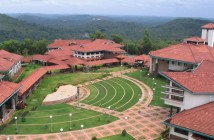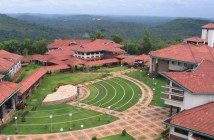Data and Analytics will move management education towards evidence-based decision making, says Prof. K. Sudhir, James L. Frank Professor of Marketing, Private Enterprise and Management at Yale.
Prof. Sudhir made the observation while delivering the SBI Life keynote lecture on ‘Management Research in the Age of Big Data’ after inaugurating the two-day 8th IMR Doctoral Conference (IMRDC), organized by Indian Institute of Management Bangalore’s IIMB Management Review (IMR) and the Office of the Fellow Programme in Management (FPM), on January 11.
“There is a buzz around Big Data and Analytics today and this has a huge impact on the way we teach management, management policies, and management research,” he said.
“With Big Data, we know a lot more about consumers, and information is power. Hence we can take informed decisions. So how we train management students in the future is going to be different. It will also lead to evidence-based decision making as we have seen in the healthcare industry. It will also minimize or eliminate organization silos and promote cross-functional activity,” he added.
Highlighting the revolution brought about by data and analytics in the banking sector, Prof. Sudhir said by using these tools, one can minimize or eliminate friction. “If you own data, you own the customer. Also, data summarization is crucial.”
Talking about causal relationships of management, he said, better data leads to richer understanding of customers – it is less about purchase and more about consumption, usage, buying journey: both individual and social. Although field experiments have now become easier, the challenge is to go beyond tactical and short term to more strategic and long term effects.”
On steps to improve the quality of doctoral studies in India, he said, “As a country’s policy, we need to improve training of Ph.D students and provide infrastructural support and mentoring opportunities from leading scholars. There can be a consortium across Indian scholars for PhD training. With feasible proactive action, Indian scholars can be at the frontier of knowledge production. Big Data and Analytics will move management education towards evidence-based management.”
He had a piece of advice for the budding researchers.“Don’t do what others do. Find new things, new ways and add new knowledge. You can do things differently. Start with managerial problems and puzzles. Concentrate on places where you have unique resources, bring in new resources, find interesting data, ask questions that no one has asked before, then find mentors and collaborators.”
Talking about research conceptualization, he said, “Motivate your work with managerial problems and trade-offs before letting the literature straitjacket your creativity.”
Earlier in the day, while welcoming the participants to the conference, Professor Raghavan Srinivasan, Director Incharge, IIMB, said, “All of you belong to institutions which in the last decade or two have put a lot of emphasis on research. Out of 1200 students we currently have, 130 are doctoral students, and we hope that at least 20 of them will convocate this year. We have updated our doctoral programme from the DBA model, where you spend the first year with PGP students and you are trained to be a professional teacher and do research, to a formal doctoral programme, where you are the researcher and in the way of becoming a teacher. So events like this are important to develop research capabilities.”
Prof. Ishwar Murthy, Dean, Faculty, IIMB, said, “These are interesting times, there are lot of opportunities in terms of Big Data, the way research in business domain has evolved. The boundaries are not well-defined anymore and there are ideas coming in from outside traditional business domains. So, it is very important to ask the right questions and enhance your knowledge.”
Prof. Rejie George Pallathitta, Chairperson, Fellow Programme in Management, said, “In India, one challenge in the field of research is that we don’t have the same level of opportunity to interact with folks from other institutions. It is very important to recalibrate one’s research. This conference will go a long way in facilitating such interactions and help develop lasting associations.”
Prof. Nagasimha Balakrishna Kanagal, Chief Editor, IIMB Management Review, said, “We assure you that a rigorous review process will add value to your work.”
The rest of the day saw paper presentations in Marketing, Economics, Public Policy and Finance, followed by a workshop on ‘Managing Salesforces in CRM Settings’, led by Prof. Sudhir. The day also included a session on fast track presentations on Marketing, Organizational Behaviour & Human Resources Management (OB & HR) and Entrepreneurship.
This year, the conference received a large number of competitive submissions from doctoral students in India and overseas. A Faculty Review Committee shortlisted 12 papers for presentation and discussion at the conference. Invited faculty discussants will critique these selected papers and provide feedback on them. The organizers of the conference have also facilitated a wider representation of the work of doctoral students through parallel fast track sessions, where 20 papers are scheduled to be presented.
The objective of the two-day IMR Doctoral Conference is to bring together doctoral students affiliated to institutions across India and overseas for an event of paper presentations, discussions with senior academics and researchers from industry, and publication-oriented development.
ALSO READ: MBA In Renewable Energy, Berlin Shows The Way
The conference is open to doctoral students in management research, who have commenced research on their thesis, and students who are pursuing their PhD outside India and would like to receive feedback from stalwarts in their field in India. The conference is designed to encourage doctoral students’ research and facilitate collaborative work among researchers from different institutions. It is the perfect forum where insightful feedback from senior researchers and academicians would help improve the quality of students’ work.
The IMR Doctoral Conference is a benchmark event in India’s doctoral student community in management which has been commended, in particular, by participants for the useful and constructive feedback provided through its ‘one exclusive discussant per paper’ format. Papers selected for the conference will be considered for publication in IIMB Management Review, subject to author approval and after completion of due review processes of the journal.
The second day of the IMR Doctoral Conference (IMRDC) 2016-2017 also has a line-up of distinguished speakers, including invited talks by Professor Debasis Mishra, Economics and Planning Unit, Indian Statistical Institute, Delhi, on ‘Recent Developments in Auction Design’ and by Professor Sathyajit Gubbi, Faculty of Economics and Business, University of Groningen, on ‘Academic Research: From Inspiration to Publication’.
The two-day event will wrap up with the valedictory ceremony and certificate presentation.
This year, the Conference Chairs are Dr. Souvik Dutta, IIMB faculty of Economics & Social Sciences, and IIMB Young Faculty Research Chair, and Dr. Prithwiraj Mukherjee, IIMB faculty from the Marketing area, and IIMB Young Faculty Research Chair.(Image Source:pixbay)




